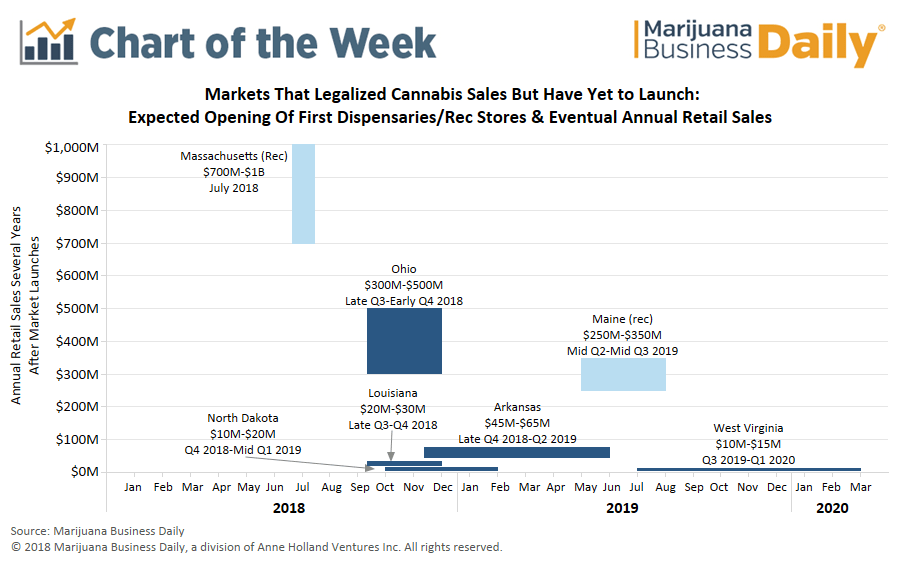More than 60% of the U.S. population now lives in states that have legalized some form of marijuana use and sales, illustrating both the rising acceptance of cannabis nationwide and the industry’s immense potential for future growth.
Several medical marijuana and recreational programs have yet to get off the ground, however.
Here’s an update on the potential size of these new markets and when sales are expected to begin:
Arkansas (medical marijuana)
The ruling has been appealed to the state Supreme Court, which is expected to issue a decision before its June 21 recess.
Sales were originally expected to begin in the second half of 2018, but that appears unlikely given the ongoing legal challenges.
With no restrictions on the forms of MMJ patients can use and a qualifying MMJ conditions list that includes chronic pain, Arkansas’ MMJ market is expected to be robust once it gets off the ground.
Louisiana (MMJ)
Officials in Louisiana suggest the state’s MMJ program is on track to launch in the third quarter of 2018, though some industry experts believe that timeline is ambitious.
While delays in the program’s rollout could prove troublesome, many are worried that the restrictive list of qualifying MMJ conditions, a ban on smokable flower and limited interest on behalf of physicians to recommend MMJ threaten the financial viability of Louisiana’s entire program.
Maine (recreational)
The implementation of Maine’s adult-use industry has been delayed several times, but legislators in May overrode Gov. Paul Lepage’s veto of a bill to establish a regulatory framework for the state’s recreational cannabis market.
It will take lawmakers several months to hash out the details of the bill, with industry insiders suggesting early 2019 as the soonest cultivators will begin growing for the rec market.
Though annual sales will be on the low end relative to other rec markets like Colorado or California, the large number of tourists who visit the state each year could provide a boost to retailers and cultivators that manage to secure a license.
Massachusetts (recreational)
Massachusetts’ adult-use market has the potential to be one of the most lucrative in the nation once it launches in July 2018.
The first recreational permits will be issued in June – most will be awarded to existing MMJ businesses – with sales scheduled to begin July 1.
The market, however, will take several years to fully develop, as the requirement for marijuana businesses to obtain approval at both the state and local levels will likely result in a slow rollout.
North Dakota (MMJ)
The director of North Dakota’s medical cannabis program said sales could begin sometime in late 2018, though that may prove overly optimistic.
Applications for dispensaries were released in early June and the two growers chosen to move forward in the licensing process still need to meet several requirements before receiving a final permit.
Only eight dispensaries will be allowed to operate in North Dakota – one of the most sparsely populated states in the country – and patients looking to use marijuana flower will need specific authorization from a physician to do so.
North Dakota’s MMJ market is expected to be one of the smallest in the U.S.
Ohio (MMJ)
Ohio’s medical marijuana program is required by law to be up and running by Sept. 8, though regulators have confirmed it will be delayed.
There’s no official word yet on when dispensaries will be open and stocked with MMJ, though it will likely be toward the end of 2018.
Despite the setbacks, Ohio’s MMJ market is expected to be one of the largest in the nation once it’s up and running.
West Virginia (MMJ)
West Virginia – the latest state to legalize MMJ – was originally slated to launch in mid-2019, but disagreement among lawmakers on rules to oversee the new program have put the rollout on shaky ground.
Some lawmakers believe issues with the regulations can be resolved quickly, but the timeline for the program’s launch remains uncertain.
The state has a tight cap on licenses and will not permit the sale of flower or edibles – which typically make up the majority of sales – so the program’s potential is limited.
Eli McVey can be reached at elim@mjbizdaily.com





